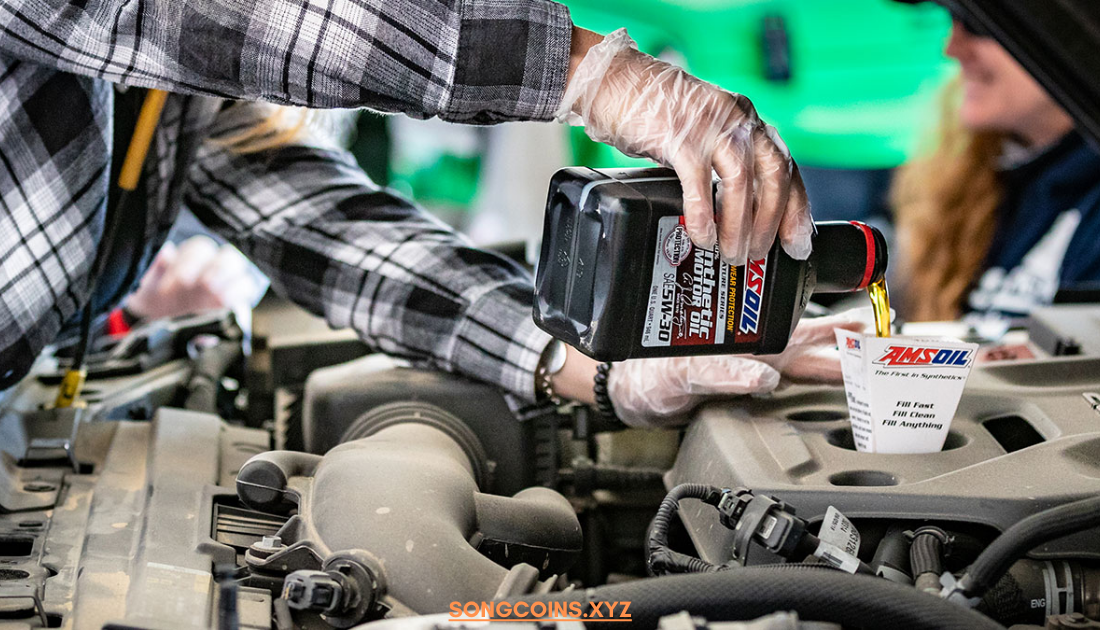Blog
Fuel-Efficient Synthetic Oil: Boost Your Engine’s Performance and Save Money
Fuel efficiency is a top priority for many car owners, especially with rising fuel costs. One often-overlooked way to enhance fuel efficiency is by choosing the right engine oil. Fuel-efficient synthetic oil is designed not only to protect your engine but also to improve mileage, making it a smart choice for those looking to save on gas. This guide covers everything you need to know about fuel-efficient synthetic oil, including its benefits and how to select the best option for your vehicle.
1. What is Fuel-Efficient Synthetic Oil?
Synthetic oil is engineered in a lab, giving it a more uniform molecular structure than conventional oil. This structure reduces friction and helps the engine run smoothly. Fuel-efficient synthetic oil is formulated specifically to improve fuel economy. By lowering the engine’s internal resistance, it allows parts to move more freely, which requires less energy. This translates into better fuel efficiency and a smoother driving experience.
- Why It Matters: Synthetic oil’s unique properties not only enhance fuel efficiency but also extend engine life by providing superior protection.
2. Benefits of Using Fuel-Efficient Synthetic Oil
Switching to fuel-efficient synthetic oil offers a range of advantages beyond improved mileage. Here’s a look at the key benefits:
- Enhanced Fuel Economy: Reduced friction means the engine doesn’t have to work as hard, which helps you go further on each gallon of gas.
- Superior Engine Protection: Synthetic oils resist breakdown better than conventional oils, providing longer-lasting protection, even under extreme temperatures.
- Reduced Emissions: With less friction, the engine burns fuel more efficiently, which can help reduce harmful emissions.
- Extended Oil Change Intervals: Synthetic oils generally last longer, meaning fewer oil changes, saving you time and money.
3. How Fuel-Efficient Synthetic Oil Works
Fuel-efficient synthetic oil is formulated with advanced additives that minimize resistance between engine parts. This oil maintains its consistency across a wide range of temperatures, unlike conventional oil, which thickens in cold weather and thins out in the heat. The stable viscosity of synthetic oil allows for a smoother operation, helping your engine achieve optimal fuel efficiency.
- Cold Starts: Synthetic oil flows faster at low temperatures, making cold starts easier on the engine and reducing wear.
- High Heat Stability: Synthetic oil doesn’t break down as quickly in high temperatures, providing consistent protection during intense driving conditions.
4. Choosing the Right Fuel-Efficient Synthetic Oil for Your Vehicle
Not all synthetic oils are the same, so it’s essential to choose the one that best suits your vehicle’s needs. Here are some factors to consider:
- Viscosity Rating: The oil’s viscosity, represented by numbers like 5W-30, indicates how it flows in various temperatures. Check your owner’s manual for the recommended viscosity.
- Additives: Some synthetic oils contain specific additives for high-mileage engines, turbocharged engines, or extreme weather conditions. Choose one that aligns with your driving needs.
- Certifications: Look for certifications like API (American Petroleum Institute) and ILSAC (International Lubricant Standardization and Approval Committee), which ensure the oil meets industry standards for fuel efficiency.

5. Top Fuel-Efficient Synthetic Oils on the Market
Here are a few fuel-efficient synthetic oils that stand out for their quality and performance:
- Mobil 1 Advanced Fuel Economy: Known for its exceptional fuel-saving properties, this oil provides reliable protection while helping improve mileage.
- Castrol Edge High Mileage: Ideal for vehicles with over 75,000 miles, Castrol Edge High Mileage is designed to reduce leaks and protect against wear.
- Valvoline Advanced Full Synthetic: This oil is popular for its excellent cold start performance and resistance to breakdown in high temperatures, making it suitable for various climates.
6. How to Maximize Fuel Efficiency with Synthetic Oil
Using fuel-efficient synthetic oil is a great start, but there are additional ways to ensure you’re getting the most out of your engine’s performance:
- Stick to Recommended Oil Changes: Follow the oil change intervals recommended in your owner’s manual. Even though synthetic oil lasts longer, changing it on time ensures optimal performance.
- Maintain Proper Tire Pressure: Underinflated tires increase rolling resistance, making your engine work harder. Check tire pressure regularly to improve fuel economy.
- Avoid Excessive Idling: Idling consumes fuel without moving the car. Turn off the engine if you expect to be stopped for more than a minute.
7. Environmental Impact of Using Fuel-Efficient Synthetic Oil
Choosing fuel-efficient synthetic oil not only saves money but also has a positive impact on the environment. Since synthetic oil allows engines to operate more efficiently, less fuel is burned. This leads to reduced greenhouse gas emissions, helping to lower your car’s carbon footprint. Additionally, synthetic oils typically last longer, meaning fewer oil changes and less waste.
- Longer Oil Life: Fewer oil changes mean less used oil to dispose of, reducing environmental waste.
- Lower Emissions: Improved fuel efficiency leads to cleaner combustion and fewer emissions.
8. Common Misconceptions About Synthetic Oil
There are a few myths about synthetic oil that might prevent drivers from using it. Here are some clarifications:
- It’s Only for New Cars: Many people believe synthetic oil is only for new or high-performance cars, but it’s beneficial for all types of vehicles, including older cars.
- It’s Too Expensive: While synthetic oil is more expensive upfront, its extended intervals and fuel efficiency savings can offset the cost.
- It Can Void Warranties: This misconception arises from confusion with specific oil requirements. Using a high-quality, fuel-efficient synthetic oil won’t void your warranty as long as it meets the recommended standards.
9. How to Switch to Fuel-Efficient Synthetic Oil
Switching to synthetic oil is simple, but following these steps ensures a smooth transition:
- Check Compatibility: While synthetic oil is safe for most engines, double-check your vehicle’s manual for any specific recommendations.
- Choose the Right Oil: Select a fuel-efficient synthetic oil with the correct viscosity rating.
- Do a Full Oil Change: Start with a complete oil change, replacing both the oil and the oil filter to maximize benefits.
Conclusion
Fuel-efficient synthetic oil offers an easy way to enhance your car’s performance, increase fuel savings, and reduce emissions. With its advanced formulation, synthetic oil helps engines run more smoothly and withstand a wider range of temperatures, making it ideal for any driver looking to optimize their vehicle’s efficiency. By choosing a high-quality synthetic oil and maintaining regular oil changes, you’re taking a proactive step toward a more fuel-efficient and eco-friendly driving experience.
Investing in fuel-efficient synthetic oil can make a big difference in both your wallet and the environment. So, whether you’re aiming to save money on gas or reduce your carbon footprint, synthetic oil is a smart choice for the road ahead.

